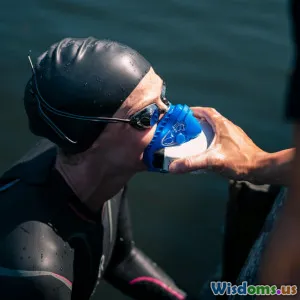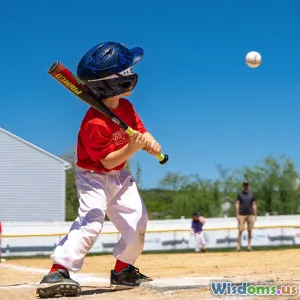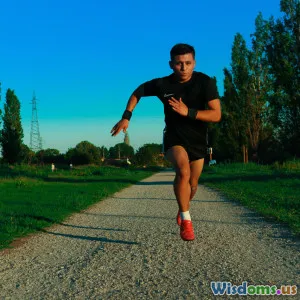
Is Sleep the Missing Link in Athletic Performance Recovery
7 min read Explore how sleep profoundly influences athletic recovery and enhances performance, revealing the often-overlooked key to optimized regeneration. (0 Reviews)
Is Sleep the Missing Link in Athletic Performance Recovery?
In the ultra-competitive world of sports, athletes often chase everything from nutrition hacks and intense training regimens to cutting-edge equipment. Yet one crucial factor may consistently be undervalued or overlooked: sleep. Could quality rest be the ultimate missing link in unlocking peak athletic recovery and performance?
Sleep is much more than just downtime; it’s a highly active, restorative biological process essential for muscle repair, cognitive function, hormone regulation, and mental resilience. Over the past few decades, mounting scientific evidence has elevated sleep to a pivotal recovery component—not auxiliary or optional, but fundamental.
The Science Behind Sleep and Athletic Recovery
Sleep is broken down into various stages, each playing distinct roles in regeneration:
-
NREM (Non-Rapid Eye Movement) Sleep: This comprises deep sleep stages, critical for physical repair. During NREM, the body increases blood flow to muscles, boosts protein synthesis for tissue repair, and releases growth hormone, which facilitates muscle recovery and adaptation.
-
REM (Rapid Eye Movement) Sleep: Dominated by brain activity, REM supports cognitive recovery, memory consolidation, and psychological resilience, all imperative for tactical decision-making and overcoming competitive pressure.
Hormonal Impact During Sleep
Athletes rely heavily on hormones like testosterone and growth hormone to repair damaged tissues and promote muscle growth. Research shows that peak secretion of growth hormone occurs during deep sleep stages. Without sufficient sleep, hormone output can be significantly diminished.
A study from Stanford University noted that collegiate basketball players who restricted themselves to 5-6 hours of sleep per night experienced a measurable decrease in sprint times and shooting accuracy compared to those who clocked 8-9 hours.
Immune System and Inflammation
Intense physical training induces micro-traumas in muscles which naturally cause inflammation. Adequate sleep helps modulate the immune response and reduce chronic inflammation that could compromise recovery and performance.
A publication in the Journal of Applied Physiology revealed that athletes suffering from sleep deprivation showed elevated markers of inflammation post-exercise, thereby prolonging recovery periods.
Real-World Insights: Sleep’s Role in Elite Athletes
High-performing athletes increasingly share how prioritizing sleep transformed their careers:
-
LeBron James reportedly invests 12+ hours daily on rest and recovery, which he credits as essential for maintaining his elite performance despite a grueling NBA schedule.
-
Novak Djokovic emphasizes quality sleep alongside nutrition and training, underscoring it as foundational for peak tennis performance and injury prevention.
Sports organizations are also evolving. The NFL has implemented mandatory sleep education and recovery protocols for players, acknowledging sleep as critical.
Sleep Deprivation: A Performance Killer
Sleep deprivation doesn’t just reduce alertness—it undermines physical capabilities:
- Reduced reaction times
- Weakened muscle strength and endurance
- Impaired cognitive functions like decision-making and focus
According to a study by the American College of Sports Medicine, athletes who slept fewer than 6 hours per night had a 70% higher risk of injury than those with 8+ hours.
This clearly illustrates sleep’s non-negotiable role in not just performance enhancement but injury prevention as well.
How to Harness Sleep for Optimal Recovery
Understanding sleep’s importance is step one—harnessing it effectively is where gains are realized.
Prioritize Sleep Quantity and Quality
Aim for 7-9 hours of uninterrupted sleep. Strategies include:
- Establishing a consistent sleep schedule
- Creating a pre-sleep routine that promotes relaxation
- Ensuring a sleep-friendly environment: dark, cool, and quiet
Napping Protocols
Short naps (20-30 mins) can boost alertness and cognitive function, while longer naps (90 mins) can mimic a full sleep cycle, aiding physical recovery especially during intense training phases.
Monitor Sleep Metrics
Wearable technology now allows athletes to monitor sleep stages and quality in real time. Analysis enables adjustments that optimize recovery.
Nutrition and Sleep
Certain nutrients promote sleep quality—magnesium, melatonin-rich foods like cherries, and avoiding caffeine late in the day.
The Future of Sleep and Athletic Performance
With technological advancements and growing awareness, sleep science is rapidly evolving into a bespoke field within sports medicine. Personalized sleep protocols integrating chronobiology (body clock science), technology-driven sleep coaching, and holistic recovery modalities are no longer futuristic concepts but current evolving standards.
Sleep optimization may someday rival training and nutrition in importance, becoming a personalized, precision tool that differentiates good athletes from the great.
Conclusion
Sleep is far from a passive state; it’s one of the most potent tools athletes have for recovery, physical regeneration, and cognitive readiness. Overlooking sleep means leaving significant performance gains and injury prevention potential on the table.
As the scientific community, coaches, and athletes continue to recognize and integrate sleep as a cornerstone of athletic success, it becomes clear that sleep is not just recovery—it is performance optimization itself. Taking your rest seriously is more than just advice; it’s a competitive edge.
Invest in sleep, and master your recovery—your body, mind, and game will thank you.
Rate the Post
User Reviews
Popular Posts















